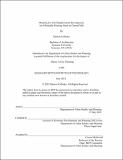Planning for Anti-Displacement Development: An Affordable Housing Study in Central Falls
Author(s)
Cafferky, Patricia
DownloadThesis PDF (21.12Mb)
Advisor
Levine, Jeff
Terms of use
Metadata
Show full item recordAbstract
The City of Central Falls is experiencing a degree of development and real estate speculation that it has not seen since the Industrial Revolution. At only 1.2 square miles and with a population of over 19,000, Central Falls is the smallest municipality in the state and third densest municipality in New England. It is also a housing insecure, high-need community, with a 30% poverty rate and an owner-occupied housing rate of only 16%. The city was a center for industry in the 19th and early 20th centuries, and has been a home to immigrants throughout its history. As manufacturing declined in the US, Central Falls was greatly impacted, and many of the mills which had once employed the community were left vacant or underutilized. Today, the city is seeing huge public and private investment. The Rhode Island Department of Transportation (RIDOT) is opening a new MBTA commuter rail station and bus hub in the city in 2022, which will connect it to Boston and Providence. Simultaneously, the city’s Conant Thread Mill District and Roosevelt Historic Mill District have dozens of old textile and manufacturing mills which are seeing rising speculative interest from both private investors and public entities. These two forces – improved public transportation and an undervalued building stock ripe for redevelopment – have the potential to bring new sources of economic growth to a city which sorely needs it, to catalyze gentrification, and, by extension, to cause cultural and residential displacement.
Concurrent to this, newly elected Central Falls Mayor Maria Rivera has decided to prioritize affordable housing creation and preservation, leading a Housing Summit within her first hundred days in office and intending on developing a city housing plan. Per the Rhode Island Comprehensive Planning and Regulation Act, each municipality also needs to develop a comprehensive plan for state approval every ten years, which Central Falls will be undertaking in the near-term. This thesis aims to contribute to these ongoing efforts, and so conducted an affordable housing study as a client-based project for the Central Falls Office of Planning and Economic Development. Through evaluating the present state of affordable housing in the city, its challenges and opportunities, the thesis attempts to answer both if Central Falls is at risk of gentrifying and what measures should be taken to shore up and improve the municipality’s stock of affordable housing. An affordability analysis, zoning analysis, policies and programs analysis, and site opportunities analysis, as well as 14 semistructured interviews make up the basis of the research for the study. The culmination of the thesis is a set of recommendations for the planning department, city council, and mayor to consider as they move forward.
Date issued
2021-06Department
Massachusetts Institute of Technology. Department of Urban Studies and PlanningPublisher
Massachusetts Institute of Technology